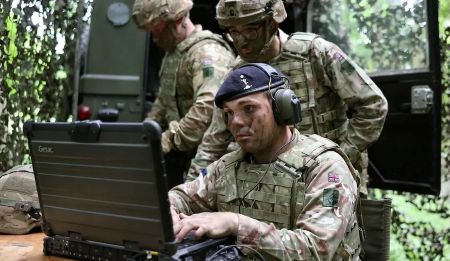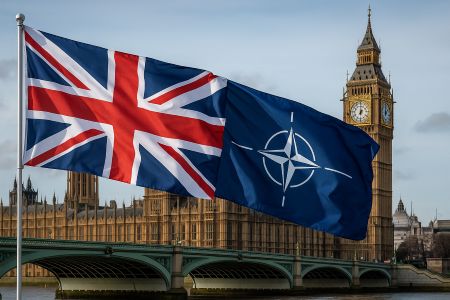In a post-Ukraine, post-Trump world, the UK pivots hard on defence — but at what cost?
THE UNITED KINGDOM’s Strategic Defence Review (SDR), published on 2 June 2025, lays out an ambitious vision for the British Armed Forces. It reiterates a focus on a ‘NATO First’ policy amid what Prime Minister Sir Keir Starmer calls, in the document, a “new era for defence and security.”
The latest blueprint for war preparedness — aimed at countering future threats in Europe and beyond — is detailed in the 2025 SDR. Among its key proposals are the construction of up to a dozen new nuclear-powered attack submarines and preparations to make the British Army ready for potential conflict in Europe. Starmer vowed that the UK would become “a battle-ready, armour-clad nation,” as he announced the review on Monday (June 2).

Keir Starmer
Starmer said Britain “cannot ignore the threat that Russia poses” as he pledged to undertake the most sweeping overhaul of UK defence capabilities since the collapse of the Soviet Union over three decades ago.
“The threat we face is more serious, more immediate, and more unpredictable than at any time since the Cold War,” Starmer told workers and journalists at a naval shipyard in Scotland last week.
The government’s military roadmap is a response to the strategic defence review commissioned by Starmer and led by George Robertson, a former UK Defence Secretary and NATO Secretary General. It is the first such review since 2021 and comes at a time when global security has been deeply shaken by Russia’s invasion of Ukraine and the re-election of Donald Trump last year.
Starmer’s centre-left Labour government has pledged to adopt all 62 recommendations of the review, aiming to bolster the UK’s preparedness across land, air, sea, and cyberspace.
Boost for Land, Air and Naval Assets
Starmer used the SDR launch to commit to building up to 12 new conventionally armed, nuclear-powered submarines to replace Britain’s seven-strong Astute-class fleet starting at the end of the next decade.
However, the review also stresses the need for the Royal Navy to evolve into “a more powerful but cheaper and simpler fleet.”

Royal Navy
It envisions the Navy playing an expanded role in securing the UK’s critical undersea infrastructure and maritime routes.
Transformation plans include the integration of unmanned technology across platforms, including a “hybrid” aircraft carrier air wing composed of both crewed aircraft and drones.
The Army, meanwhile, is expected to deliver a “tenfold increase in lethality” while modernising and re-equipping — especially as much of its current arsenal, including Challenger 2 tanks and ammunition, has been transferred to Ukraine.
A new “Digital Warfighter Group,” using AI and drones, is to be established by July 2026. The review notes that the UK is “already under daily attack” in cyberspace, and warns that cyber-threats will become harder to counter as AI and other technologies evolve.

Uk Military To Establish New Cyber And Electromagnetic Command
A new Cyber and Electromagnetic Command will oversee cyber operations, with an emphasis on civilian and reserve staffing, as much of the required expertise lies in the private sector.
While the UK is said to have world-class intelligence capabilities, the review concludes they are “underpowered and fragmented” within Defence Intelligence — a part of the Ministry of Defence (MoD). It recommends the creation of a dedicated unit to shield military operations from hostile intelligence services.
Why the SDR?
Essentially, the SDR aims to send a clear signal to both Moscow and to President Trump in Washington — affirming that Europe is taking greater responsibility for its own defence.

Trump has long questioned the value of NATO
European countries, led by the UK and France, are scrambling to align their defence posture as Trump appears to sideline NATO and moves to end the war in Ukraine.
Trump has long questioned the value of NATO and criticised European members for not contributing enough to their own security.
Reaffirming the UK’s commitment to NATO, Starmer said his government would make “Britain’s biggest contribution to NATO since its creation.”
“We will never fight alone,” he declared. “Our defence policy will always be NATO-first.”
Criticism of the SDR
Unsurprisingly, the SDR has reignited debate about whether Starmer is following in the footsteps of Tony Blair. While Starmer has maintained some distance from the Blairite wing of the Labour Party, critics argue that his latest moves echo Blair-era alignment with U.S. policies.
Simon Tisdall, writing in The Guardian, warns that plans to modernise and potentially expand Britain’s nuclear arsenal — unveiled in SDR 2025 — severely undermine global non-proliferation efforts. He argues that this could fuel a new arms race involving the U.S., China, and Russia, and heighten the risk of tactical nuclear weapons being used in conflict zones.
“This dangerous path leads in one direction only: towards the normalisation of nuclear warfare,” Tisdall writes.
Symon Hill, writing for the website Christianity, notes that the UK already maintains one of the world’s highest military budgets and possesses enough nuclear weapons to cause mass destruction.

“Although NATO’s military spending is several times greater than Russia’s, this failed to deter Putin’s vile invasion of Ukraine. Why should more of the same succeed now?” he asks.
He adds that neither Conservative nor Labour governments have done enough to support Russia’s peace movements or to offer asylum to Russian dissenters.
Paul Rogers, in OpenDemocracy, criticises the SDR for ignoring two critical issues: the UK’s recent military misadventures and the global climate crisis.
“The UK is now engaged in its fourth disastrous war in 24 years,” Rogers notes, referring to the country’s support for Israel’s ongoing assault on Gaza.
 While Starmer has described Israeli actions as “appalling and intolerable,” Rogers points out that his government has taken no meaningful steps — such as recognising a Palestinian state, halting arms sales to Israel, or ending RAF base access in Cyprus for Israeli forces.
While Starmer has described Israeli actions as “appalling and intolerable,” Rogers points out that his government has taken no meaningful steps — such as recognising a Palestinian state, halting arms sales to Israel, or ending RAF base access in Cyprus for Israeli forces.
Rogers also highlights the irony that, after campaigning for a green industrial revolution, the Labour government has quietly dropped its environmental commitments in favour of increased defence spending.
“The corporate capture of the Labour government,” Rogers concludes, “is now complete.” ![]()
________
Also Read:
Can a Fungus Trigger India’s Next Crisis?
Disclaimer : PunjabTodayNews.com and other platforms of the Punjab Today group strive to include views and opinions from across the entire spectrum, but by no means do we agree with everything we publish. Our efforts and editorial choices consistently underscore our authors’ right to the freedom of speech. However, it should be clear to all readers that individual authors are responsible for the information, ideas or opinions in their articles, and very often, these do not reflect the views of PunjabTodayNews.com or other platforms of the group. Punjab Today does not assume any responsibility or liability for the views of authors whose work appears here.
Punjab Today believes in serious, engaging, narrative journalism at a time when mainstream media houses seem to have given up on long-form writing and news television has blurred or altogether erased the lines between news and slapstick entertainment. We at Punjab Today believe that readers such as yourself appreciate cerebral journalism, and would like you to hold us against the best international industry standards. Brickbats are welcome even more than bouquets, though an occasional pat on the back is always encouraging. Good journalism can be a lifeline in these uncertain times worldwide. You can support us in myriad ways. To begin with, by spreading word about us and forwarding this reportage. Stay engaged.
— Team PT

